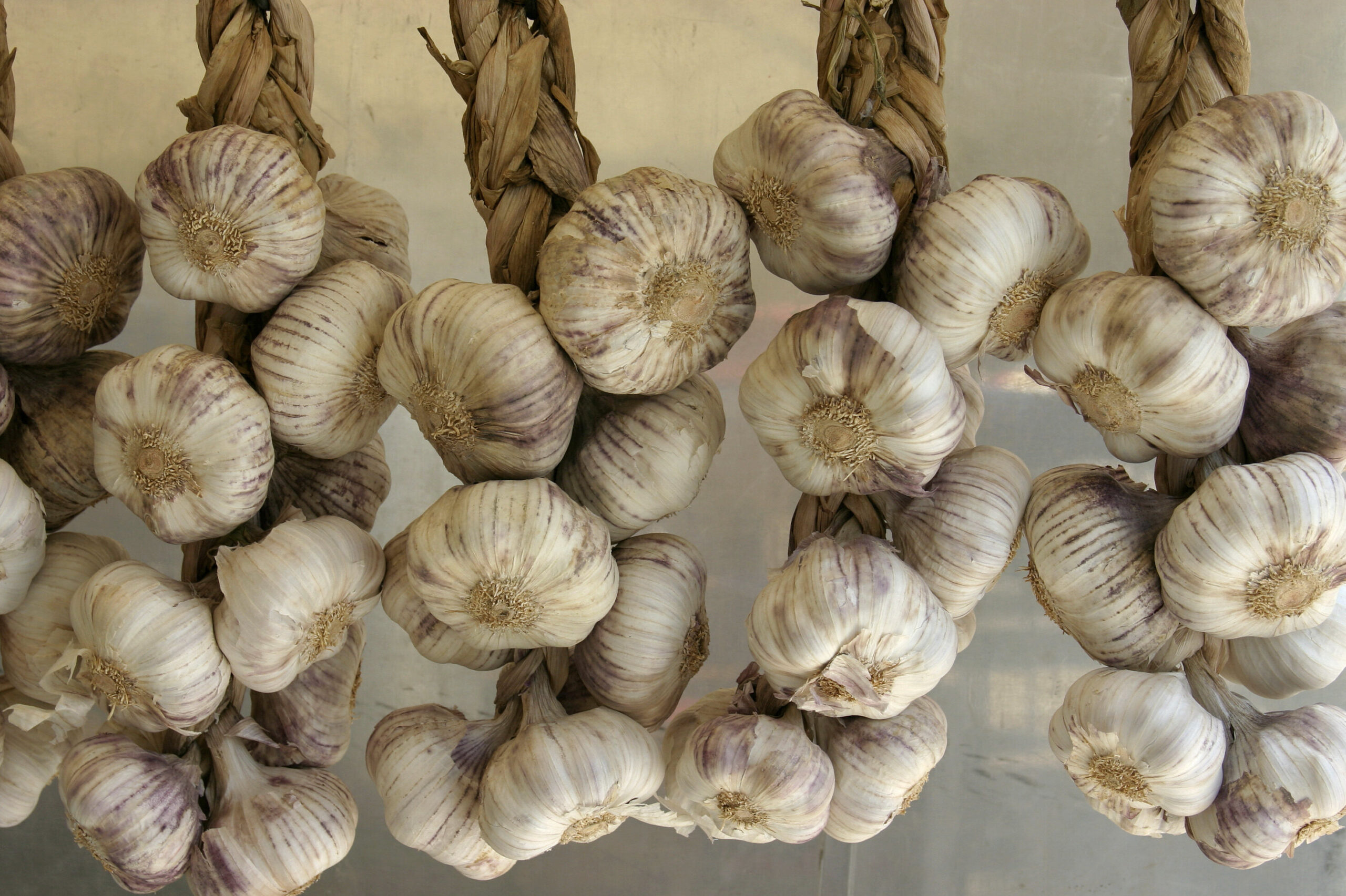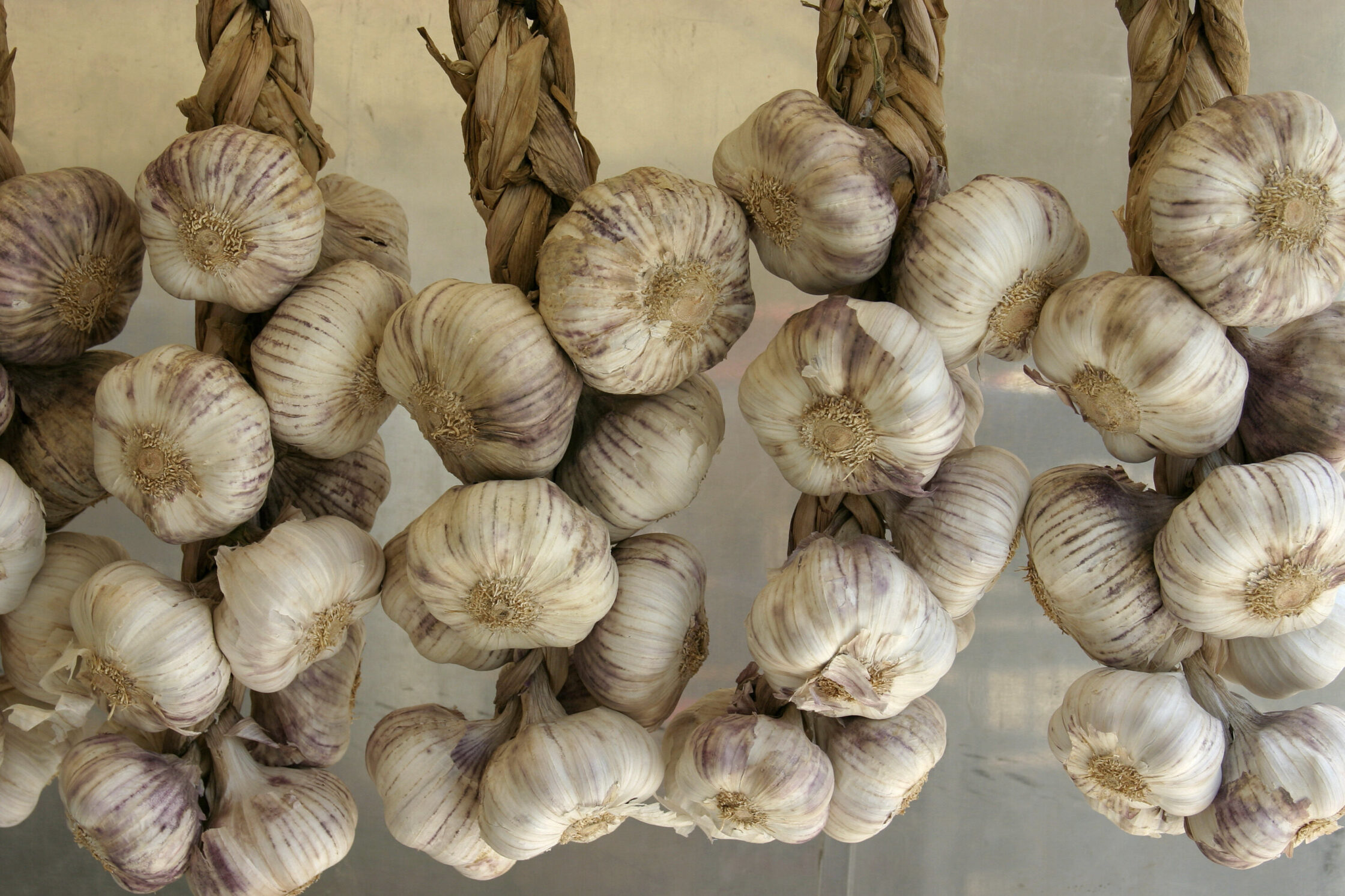We have all heard that consuming raw garlic has health benefits, but is this true? And if so, is it possible to achieve these health benefits without eating garlic in the raw form?
Garlic has been used for centuries for both medicinal and cooking purposes. Garlic has been found in the Egyptian pyramids and ancient Greek temples, and it’s mentioned in ancient medical texts from all over the world. It was used by the original Olympic athletes in Greece as one of the earliest ‘performance enhancing’ agents.

What are the claimed benefits of consuming raw garlic?
- Reduce blood pressure and lower cholesterol which in turn helps prevents cardiovascular disease
- Purifies your blood by detoxifying heavy metals in the body
- Beats cold and flu
- Anti-bacterial and anti-parasitic properties
- Improves skin and hair
- Helps prevent Alzheimer’s and dementia
- Improves performance in exercise
- Cancer prevention
- Anti-inflammatory properties
What is the evidence?
Reduce blood pressure and lower cholesterol which in turn helps prevents cardiovascular disease
- There are large amounts of research that support this statement. In this research it has been shown that consumption of garlic extracts reduces both systolic and diastolic blood pressure. It has been suggested that the antihypertensive activity of garlic is due to its prostaglandin (a group of physiologically active lipid compounds)-like effects, which decrease peripheral vascular resistance (resistance in the circulatory system that is used to create blood pressure).
- There are mixed results of garlic’s effect on cholesterol levels. In some research garlic lowered LDL cholesterol (bad cholesterol) and increased HDL cholesterol (good cholesterol) which is a protective mechanism against cardiovascular disease. In addition, it has been suggested that garlic should be considered as an alternative option to cholesterol lowering medication (do not make any changes to your medications without consulting your doctor). On the other hand, some studies failed to show lipid lowering effects. There is a possibility that people may have varying responses to garlic and therefore a one size fits all approach is impossible.
- There has been some promising early research into garlic preventing thrombosis.
Purifies your blood by detoxifying heavy metals in the body
- There is limited evidence on this point, however garlic was shown in one study to significantly reduce lead toxicity and related symptoms. This reduction was thought to be due to the sulphur compounds present in garlic.
- The study was performed on employees of a car battery plant, an environment which led to excessive exposure to lead. After 4 weeks, the garlic has reduced lead levels in the blood by 19%.
Beats cold and flu
- A research study showed that those taking a daily garlic supplement had 63% less colds than those not, and the average length of a cold was also reduced by 70%.
- However, there have not been enough studies to confirm this conclusion, so although a promising result more research is needed.
Anti-bacterial properties
- The antibacterial property of garlic is widely attributed to allicin, a component in garlic. A sample of pure allicin was shown to be antifungal. Garlic has been shown to decrease oxygen uptake, reduce the growth of the organism and damage membranes which will in turn kill the organism.
- In comparison with the antibacterial action of garlic, very little research has been done on its antiviral properties.
Helps improve skin and hair
- Due to the high antioxidant properties garlic is good for skin and hair. This is explained in more detail in the article written about curry leaves, see that here.
Helps to prevent Alzheimer’s and dementia
- Garlic is high in antioxidants. To read about what antioxidants are and the benefits of them click here.
- High blood pressure and cholesterol increase the risks of diseases like Alzheimer’s and dementia. As garlic potentially has the ability to reduce high blood pressure and cholesterol and is high in antioxidants it could help prevent against cell damage and aging and thus reduce the risk of Alzheimer’s and dementia.
Improves performance in exercise
- Although used in the past for aiding exercise performance, there have been very few human studies conducted to determine the effects of garlic on performance in exercise.
Cancer prevention
- Garlic has been shown to contain potent bioactive compounds with anticancer properties, the most abundant being allylsulfide derivatives.
- The U.S. National Cancer Institute initiated a programme to determine which foods played an important role in cancer prevention. The conclusion was that garlic may be the food with the highest cancer preventive properties.
- It has been suggested that garlic has a variety of anti-tumour effects (including tumour cell growth inhibition).
Anti-inflammatory properties
- Garlic contains diallyl disulphide, an anti-inflammatory compound that limits the effects of pro-inflammatory cytokines. Therefore, it can help fight inflammation.
- The Arthritis foundation also suggest that it may help prevent cartilage damage from arthritis.
Can I obtain the same benefits without consuming the garlic raw? And how much of it should I eat?
As with many topics where the scientific research is relatively new, there is debate about how best to consume garlic, the best preparation and quantities to consume. To put it frankly, we don’t know as not enough research has been done to draw any solid conclusions. Below I will summarise the research that has been done.
- Garlic contains a compound called Alliin and an enzyme called Alliinase, when the garlic is chopped these come in contact producing the active component Allicin.
- If you do not chew or chop the garlic the allicin is not formed, some research says to chop the garlic and allow it to sit before 10 minutes before consuming it.
- Allicin will be destroyed by heat. Research published in the Food and Chemical Toxicology found that short-term heating reduces the anti-inflammatory effects of fresh raw garlic.
Short-term heating reduces the anti-inflammatory effects of fresh raw garlic.
- Allicin is also destroyed by stomach acid. This is why letting it sit will give your body the best chance of absorbing some of the active ingredient.
- It has also been suggested that fresh garlic is better than processed garlic where preservatives may have been added which in turn could decrease some of the garlic’s helpful properties.
- Garlic oil in capsules can be misleading as frequently the percentage of garlic oil is very low and the rest is made up of vegetable oil.
- Garlic powder tablets which are enterically coated are the best option as these are protected against the stomach acid. This also counteracts the smell of the garlic on your breath.
Conclusion
From the research it seems that raw garlic, or enterically coated garlic powder tables are likely to be the garlic preparations that provide the most health benefits. Garlic powder tablets will have fewer negative effects such as bad breath and body odour.
If you are due to have surgery or are taking an anticoagulant (blood thinning) medication, please speak to your health care providers before taking garlic supplements as they can interfere with medication. Excessive garlic consumption has also been linked to anaemia, bloating, diarrhoea and liver damage.
Long-term trials would provide more insight into the possible side-effects of different garlic extracts and produce more reliable evidence regarding the health benefits linked to the different forms of preparation.
Studies discussed in the article
Garlic: a review of potential therapeutic effects
Leyla Bayan, Peir Hossain Koulivand, and Ali Gorji
Link- https://www.ncbi.nlm.nih.gov/pmc/articles/PMC4103721/
Immunomodulation and Anti-Inflammatory Effects of Garlic Compounds
Rodrigo Arreola, Saray Quintero-Fabián, Rocío Ivette López-Roa, Enrique Octavio Flores-Gutiérrez, Juan Pablo Reyes-Grajeda, Lucrecia Carrera-Quintanar and Daniel Ortuño-Sahagún.
Link- https://www.hindawi.com/journals/jir/2015/401630/
Short-term heating reduces the anti-inflammatory effects of fresh raw garlic extracts on the LPS-induced production of NO and pro-inflammatory cytokines by downregulating allicin activity in RAW 264.7 macrophages.
Shin JH1, Ryu JH, Kang MJ, Hwang CR, Han J, Kang D.
Link- https://www.ncbi.nlm.nih.gov/pubmed/23583806
The antioxidant properties of garlic compounds: allyl cysteine, alliin, allicin, and allyl disulfide.
Chung LY
Link- https://www.ncbi.nlm.nih.gov/pubmed/16822206



